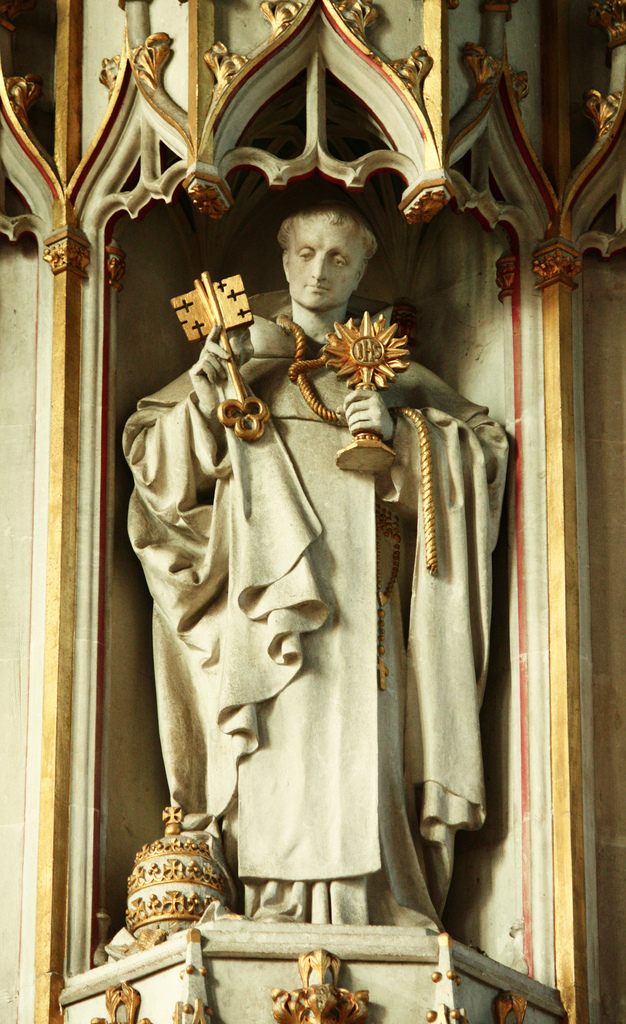In his Decree of Canonization, St. John of Cologne was praised as a “great athlete of Christ.” As his title suggests, this Dominican priest is best known for the victory of his martyrdom, but it was his lifelong training in fidelity, lived through the Dominican charism, which prepared him for this final conquest.
St. John attended the University of Cologne in the middle of the sixteenth century. Although we don’t know much about his early life, we can learn something about it from John’s cultural setting. At this time, western Germany, Belgium, and Holland were dominated by Calvinist teaching, which viewed human nature as completely corrupt and denied the healing action of grace. As a result, even many Catholics had lost a sense of the reality of the sacramental life. Not unlike today, many in John’s age found moral absolutes hard to identify, and faith had become relegated to the private sphere.
Amid these uncertain cultural currents, John discovered the solid foundation of truth when he began his studies at the University of Cologne, then recognized as one of the best educational institutions in Europe. Not only did John acknowledge intellectual truth, but he also came to know the Person of Truth, Jesus Christ, and followed His call to the Dominican Order. He entered the Order at Cologne and received his formation there.
After completing his education, John was assigned to a parish in the Netherlands village of Horner, where he served for twenty years. Although we do not have records of the sermons of John of Cologne, his final actions give the most eloquent testimony about what he considered the purpose of his priestly vocation. In the spring of 1571, a group of militant Calvinists along with a band of pirates began raiding Dutch villages, particularly focusing on the arrest and capture of the Catholic clergy. In June of that year, the neighboring town of Gorkum was attacked, and the clergy were captured. Fifteen priests, the majority of them Franciscans, had been imprisoned.
Upon hearing of their arrest, John immediately disguised himself and sought to bring these priests the consolation of the sacraments. For several days he was successful, but was eventually captured along with three other priests. These nineteen were imprisoned in Gorkum from June 26 until July 6, undergoing much abuse as they were asked to deny the tenets of the Catholic faith.
On July 6, the nineteen martyrs were transferred to the prison at Dortrecht. Along the way, villagers were charged admission for viewing the torture of the priests. Once in Dortecht, each of them was asked to deny belief in the Real Presence of Christ in the Eucharist and in the primacy of the Pope. Each one remained steadfast in his profession of faith. Despite an order from the Dutch ruler William of Orange that the priests not be harmed, they were cruelly mutilated and hanged on the night of July 9, 1572. The Dominican John of Cologne, great athlete of Christ, had won his final victory of martyrdom. Along with his companions, he was beatified on November 14, 1675 and canonized on June 29, 1865.
-by Br Richard Steenvoorde, OP, English Province
“The story of saint John of Cologne O.P. (+1572) proves that you can become a saint by doing the right thing at the right time.
John of Cologne was a 17th century Dominican in what is now the Netherlands, near the city of Gorinchem. He was a parish priest. In 1572 John is caught up in the Dutch Wars of Independence from Spain, which, confusingly, at the same time were also civil wars over religion. A band of Calvinist rebels had captured one city near Rotterdam, and introduced the strictest form of Calvinism possible. From there they undertook their raids in aid of the rebellion led by the protestant prince William of Orange (not to be confused by the later English King).
The rebels captured the town of Gorkum (present day: Gorinchem) and imprisoned all of the Franciscans, and some secular priests. They would be released if they would swear allegiance to the new Calvinist faith. Now John heard of this, and -in disguise- went out to visit the prisoners in order to give them Holy Communion. However, he was betrayed, and was added to the prisoners.
Soon after that, the group was shipped off to the centre of a Calvinist stronghold: Den Briel (Brielle). Upon arriving, they were forced to process around the gallows near the harbor.
“Sing”; the people shouted mockingly: “Sing something about Mary”. And one young friar finds the courage to sing. And the others join in. And suddenly the people are moved by the dignity of these men. Tears well up, and a deep silence comes over the crowd when the men stop. Quickly the pirates move the men to another pair of gallows in the town’s centre and force them to sing again, and they sing the Te Deum.
A mock trial follows, a late intervention by the Prince of Orange to save the men goes horribly wrong. The men are hanged in an old stable, part of a ruined monastic complex.
How must our brother John have felt in all this? We don’t know. No words of his were preserved. But I think his life is a sermon for us. He went out to bring Christ to others in need. He joined them in their suffering. Staying dignified, impressing their executioners, praying to God, finding courage through their deepest fears.
By this testimony, I think, the Martyrs of Gorkum, including friar John, have given us a testimony of what it means to be blessed in times of great adversity. Between how people treat us, and how we respond, there is a choice. John chose to respond as he had probably preached many times before. To witness that evil has not the last word. That through Christ’s redemptive work, we are truly blessed.”
Love,
Matthew




